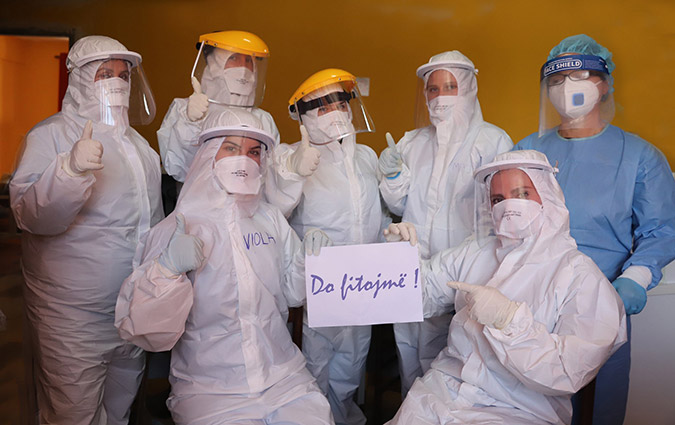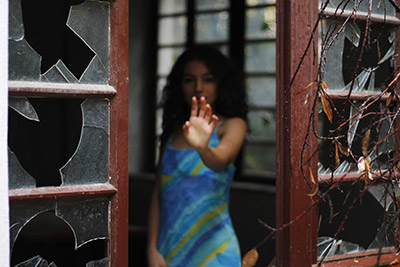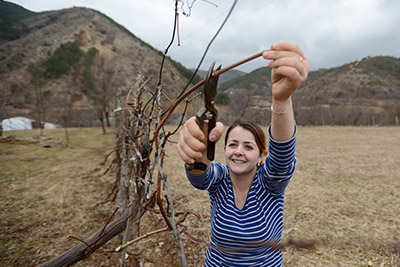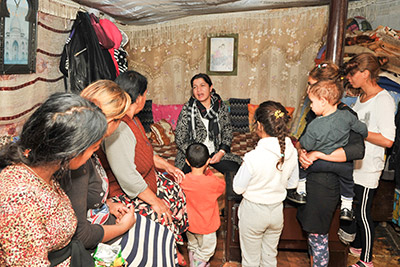Unpacking the impact of COVID-19 on women and girls in Albania
Date:
This story has been originally published by UN Women Albania.

It has been a month since COVID-19 was declared a global pandemic and life was disrupted in more than 200 countries. With the world experiencing the greatest socioeconomic shock since World War II, existing disparities and inequalities amplify, with women often being hit hardest by the emergency.
Evidence on the impact of the new coronavirus shows that the life of women will be affected disproportionately compared with the life of men. Women have been hit harder by the economic uncertainty caused by the pandemic, and they face greater risk of domestic violence during confinement. While their unpaid care burden has increased dramatically, access to health services decreases.
Albania is no exception to this global concern: with the country’s prompt and resolute response, restrictive measures to counter the spread of the virus have significantly altered public and social life. But how have those measures impacted women and girls – including those from vulnerable groups – and how are they coping with the strain of an uncertain future?
While it undertakes a rapid gender assessment of the impact of COVID-19 on the Albanian population, UN Women has been liaising with different women’s rights groups and civil society organizations that it partners with to get a better understanding of the situation and look at ways to respond to specific vulnerabilities. The testimonies collected below provide an account of how COVID-19 is affecting the lives of survivors of domestic abuse, women in rural areas, women living with disabilities, and members of the Roma and Egyptian communities.
A shadow pandemic

Countries around the world are reporting an increase in the prevalence of violence in the home during the health emergency. UN Women has labelled this violence against women and girls a shadow pandemic. In Albania, we see a different trend, with available data suggesting there have been 141 fewer domestic violence reports compared with March 2019. Marsela Allmuca, project manager at the Shelter for Women and Girls in Tirana, says that since the lockdown the shelter has not received any requests from individuals or institutions to accommodate survivors of domestic violence. “This confirms once again what we often say: survivors of violence in Albania endure a lot and report violence at a relatively later stage; and addressing domestic violence seems to be considered a luxury in the current state of survival.”
For Ms Allmuca, it is crucial to find ways right now to reach out to women and girls, to inform them that the police, social services and municipalities remain available to help them. However, confinement measures are putting a great deal of pressure on those responsible for protecting vulnerable people. Ms Allmuca witnessed a case in which three survivors needed movement assistance; the police were not able to provide as they were overwhelmed with the crisis response. “It is important to inform responsible institutions and remind them of their obligations to prioritize domestic violence, and ensure that survivors are granted mobility and support,” says Ms Allmuca. “Safe and secure services responding to the needs of these women must continue to be made available.”
The past weeks have also been very hard for staff at shelters, who have found it difficult to apply quarantine conditions. “We have survivors of violence who must go out to work. They cannot risk losing their jobs as this would worsen their situation. To minimize further risks, some survivors were moved to another apartment that we rented for a month, and another survivor to a close relative.”
Manjola Veizi, Head of the National Network of Roma and Egyptian Women, says there has been an increase in violence against Roma women. “In many Roma families, women are the breadwinners. But now they are not working, and staying home 24/7 has increased domestic violence. They do not report abuse because they are scared. They also do not own mobile phones and are not able to go out and reach networks or organizations that provide support,” she says.
It is recognized that women with disabilities face a range of barriers in accessing gender-based violence programmes and services, including information being in inaccessible formats and lack of transportation to health facilities and women’s centres. Blerta Çani, Executive Director of the Albanian Disability Rights Foundation, recommends that during the COVID-19 pandemic, services that respond to gender-based violence should adopt approaches when responding to the needs of women with disabilities and their caregivers.
To help address these challenges, UN Women has supported the Ministry of Health and Social Protection to develop and adopt an emergency protocol for shelters. The new protocol, issued on 10 April, aims to ensure undisrupted provision of services during the COVID-19 emergency. Implementing the emergency protocol will help shelters to provide the necessary services to survivors of domestic violence and trafficking, without compromising their health and lives. As part of the EU-funded regional programme on Ending Violence Against Women in the Western Balkans and Turkey, UN Women is also mapping the needs of women’s rights organizations that support survivors of violence. This aims to adjust interventions in combating violence against women to the new conditions imposed by the crisis.
Making women visible

As COVID-19 is having a profound impact on the world economy, women’s livelihoods are affected differently from men’s, especially for those who already live on the poverty margins. According to United Nations data, in developing economies 70 per cent of women’s employment is in the informal economy, with little recourse against dismissal and limited access to social protection.
In Albania, strict measures to inhibit COVID-19 weigh on disadvantaged groups such as female heads of households and rural women, especially in remote areas. “This is an extraordinary challenge for women in rural areas,” says Fabiola Egro, Executive Director of Today for the Future Community Development Centre. “They have worked all their lives within family economies. Under confinement and isolation, they remain without income, and are unable to benefit from support schemes.”
According to Ms Egro, although the Albanian Government has taken broad measures to provide economic support to different groups, these women are invisible and left out of the Government’s schemes. With almost 90 per cent of rural family businesses registered in men’s names, women are completely unable to secure their basic needs.
“We have called on local governments to apply gender lenses in the socioeconomic support schemes adopted, including using sex-disaggregated data when preparing beneficiaries’ lists. This would mean including in the COVID-19 support schemes those categories that are left behind, such as women who work in and outside their homes while they are just shadows,” says Ms Egro.
Today for the Future Community Development Centre, with the support of volunteers, is distributing food, education and school supplies for children, and providing psychological and legal counselling. In addition, the Centre has created small online groups of women to identify their needs and common challenges.
Leaving no one behind

The COVID-19 pandemic poses devastating risks for women and girls living with disabilities. The structural barriers they already face is amplified, and they are confronted with additional challenges. According to 2018 data from social services, there are 140,840 people living with disabilities in Albania.
Blerta Çani, Executive Director of the Albanian Disability Rights Foundation, highlights that the lives of many people with disabilities depend on social and rehabilitation services – which are currently closed.
“Depending on their disability, many people find it hard to take the necessary hygiene measures to protect themselves from coronavirus. It is also difficult, if not impossible, for many others to maintain their social distance because they require constant care and support,” says Ms Çani. She explains that many people with disabilities are at greater risk from COVID-19 because of their weak immune system or respiratory complications. In addition, while the health system is mobilized to address the pandemic, it becomes more difficult for people living with disabilities to access health facilities or pharmacies.
Ms Çani notes the lack of information about COVID-19 as another challenge: “Despite the positive reaction of the Government to provide information about COVID-19 in sign language to people with hearing impairment, the media and other institutions do not implement this legal obligation. Moreover, people with other impairments do not have this information in accessible formats,” she notes, arguing that emergency plans to address health-related emergencies should never leave anyone behind, including people in closed institutions such as mental health units.
Manjola Veizi is raising her voice for one of the most marginalized communities in Albania. She has sent an open letter to the Ministry of Health and Social Protection calling on institutions to take appropriate measures to ensure the survival of Roma and Egyptian families and support them to overcome this unprecedented situation.
“The majority of the Roma and Egyptian population is unemployed and live in extreme poverty. They rely on casual work such as the collection and sale of recyclables, used clothing, construction or cleaning – all activities that have become impossible during the lockdown,” says Ms Veizi.
The National Network of Roma and Egyptian Women welcomes the initiative of the Government to support families in need but notes that this intervention is being done based on the database of people receiving economic assistance or people who are beneficiaries of social centre services. “A major problem is that around 30 per cent of the Roma population, including single mothers, are not beneficiaries of this scheme because they lack divorce papers or civil and residential documentation. As such, they have obstacles in applying for economic support,” says Ms Veizi.
She worries that the crisis will impact particularly the future of Roma women and girls who cannot access online education because they do not own mobile phones or have internet access. School closures also mean that girls are required to take on more chores at home, compared with boys. “This affects girls disproportionately. There will be an education gap, leading to more girls dropping out of school before they complete their education,” highlights Ms Veizi.
As the fight against COVID-19 goes on, UN Women will continue to support the work of civil society organizations, as they play a key role to help address the needs of the most marginalized and disadvantaged groups, whose lives are put in danger by the current crisis.